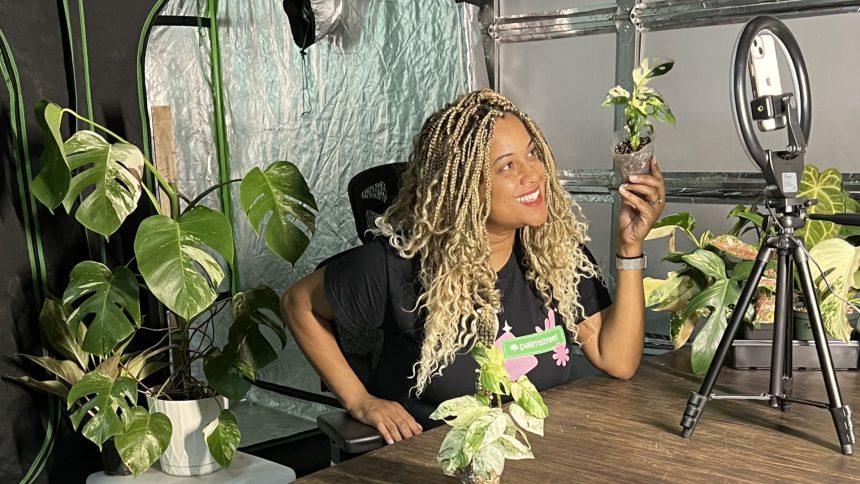This story is part of CNBC Make It’s Six-Figure Side Hustle series, where people with lucrative side hustles break down the routines and habits they’ve used to make money on top of their full-time jobs. Got a story to tell? Let us know! Email us at [email protected].
When Leena Pettigrew tells friends she earns over $100,000 per year selling plants online, they usually think she means cannabis.
In reality, the full-time IT analyst spends 20 hours per week sourcing, growing, packaging and selling houseplants from variegated micans and Anthurium luxurians to Philodendron Ring of Fires in her Houston garage.
With almost no prior gardening experience, Pettigrew started buying plants to redecorate her house in 2022, she says. When her office, bedroom and living room became “overrun” with eight-foot-tall Monstera plants, she looked for ways to sell them.
Her search led her to Palmstreet, an online marketplace for plants, crystals and home decor. She joined the platform in June 2023, and brought in nearly $148,600 of revenue in one year, according to documents reviewed by CNBC Make It.
The 44-year-old is also a paid consultant on the platform now, and helps train new sellers, she says.
DON’T MISS: The ultimate guide to earning passive income online
Most of her sales come from livestream sessions. Twice per week, Pettigrew auctions off plants — purchased from local nurseries or other online vendors — for four hours, or more, at a time on Palmstreet. Sometimes, she’s joined by her husband Marquise. They sell roughly 100 plants each stream, all of which ship nationwide, she says.
“When I first started, I was extremely anxious on camera and felt like I had to do a lot of preparation to be successful,” says Pettigrew, adding: “I still get nervous and sometimes take a shot of bourbon beforehand.”
Yet her business is profitable and earns enough for her husband to significantly cut his working hours at an automotive shop they co-own, she says. Marquise and five contract employees now help Pettigrew with customer service, marketing and shipping.
Here, Pettigrew discusses how she honed her side hustle, the pros and cons of turning her hobby into a business, and how other people can replicate her success.
CNBC Make It: Do you think your side hustle is replicable? How much does it cost to get started?
Pettigrew: I think almost anyone can do it — but not everyone.
Palmstreet is competitive. It costs about $1,000 to build enough of an inventory for the platform to accept your application. There’s a commitment that goes into this, whether it’s selling on livestreams, taking care of your plants or posting on social media.
You have to stand out. Good customer service and having unique plants can help, but I think personality makes the biggest difference. If you want people to watch your livestreams, you have to have enthusiasm and joy for what you do, and be yourself.
Does that level of enthusiasm and joy come naturally to you?
I’m very introverted and shy. When I first started, my husband had to come out on livestreams with me so I’d feel more comfortable. We’re both silly, so he helps me goof around, have fun and not take myself so seriously, which I think helps us connect to customers.
I also have to have a little downtime after livestreams. Otherwise, I’m irritable.
You and your husband co-own an auto shop, and your husband still spends about six hours per week running it. What’s the biggest difference between that and selling plants online?
Selling plants is a lot less stressful.
In the auto shop, customers relied on us to get to work. Sometimes, having their car break down, and having to pay for it, was the worst day of their lives. Our workers relied on us for their household incomes, too, and it was hot and dirty.
When we sell plants, people are spending their disposable income on things they want. Our contract workers are part-time, and while there’s still some dirt involved, it’s at least more concentrated.
Have you experienced any downsides to turning your hobby into a business?
The side hustle, and my husband and I’s remote jobs, are all out of our house. That can make it hard to stop working.
Sometimes, we feel like we don’t have time for our spiritual needs. So, we’ve started taking weekend trips, even just around Texas, to physically get out of the house, get away from work and connect with each other.
Once you own your own business, you can’t turn it off. There’s always something more to do.
Want to make extra money outside of your day job? Sign up for CNBC’s new online course How to Earn Passive Income Online to learn about common passive income streams, tips to get started and real-life success stories.
Plus, sign up for CNBC Make It’s newsletter to get tips and tricks for success at work, with money and in life.
Read the full article here




